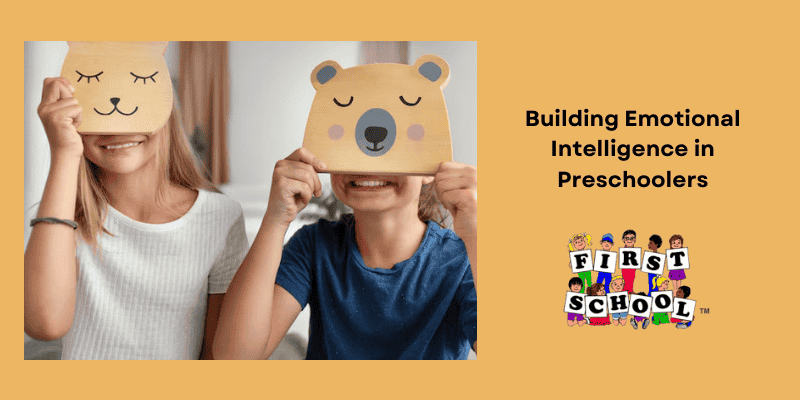Every smile, tear, and hug carries a story, particularly in a preschooler's world. Emotional intelligence involves recognizing and managing these feelings and guiding young children to become empathetic and self-aware. When nurtured early, emotional intelligence enables children to build meaningful relationships and manage small and significant life challenges.
This blog will let you explore how emotional intelligence shapes preschoolers’ growth, its core components, and practical ways to nurture these skills for lifelong success.
What Is Emotional Intelligence?
Emotional intelligence fundamentally refers to the capacity to recognize, understand, and manage one's emotions while also empathizing with the feelings of others. For preschoolers, this encompasses skills such as sharing, taking turns, expressing feelings in appropriate ways, and resolving conflicts.
Encouraging emotional intelligence in preschoolers is crucial for their social and emotional development. Children who can identify and communicate emotions are more likely to build friendships and adjust to new situations. These abilities also lay a solid groundwork for future academic and social achievements.
Why Emotional Intelligence Matters in Preschool Years?
The emotional development of a preschooler is a critical phase in their overall growth. Emotional intelligence skills directly impact how children interact with their peers, handle conflicts, and follow instructions.
- Recognize and manage their emotions effectively.
- Empathize with others, building meaningful and lasting relationships.
- Regulate their behavior, enhancing their ability to focus, learn, and adapt to new situations.
Emotional intelligence has long-term advantages, including better academic performance, stronger relationships, and improved problem-solving skills. These benefits highlight the importance of promoting social-emotional learning in preschool.
Key Components of Emotional Intelligence in Preschoolers
To encourage emotional intelligence, it’s essential to concentrate on these key elements:
Self-Awareness
This means assisting children in identifying their own emotions and grasping how their feelings affect their behavior. For instance, a child might express, “I’m angry because I can’t play outside,” rather than resorting to a tantrum.
Self-Regulation
Guiding children to handle intense emotions, such as frustration or disappointment, enables them to respond calmly and thoughtfully instead of acting on impulse.
Empathy
Empathy involves the capacity to comprehend and share the emotions of others. For preschoolers, this could mean comforting a friend who is feeling down or sharing toys to bring joy to someone else.
Social Skills
Cultivating cooperation, communication, and problem-solving skills allows preschoolers to interact effectively with peers and adults. These abilities set the stage for their future social and academic experiences.
Strategies to Boost Emotional Intelligence in Preschoolers
Here are practical ways to nurture emotional intelligence:
Model Emotional Intelligence
Children learn by example. Demonstrate how to express feelings and manage emotions healthily. For example, saying, “I feel frustrated, so I’ll take a deep breath” teaches children to respond constructively to emotions.
Teach Emotion Vocabulary
Introduce a range of feeling words, like “happy,” “excited,” “nervous,” and “sad.” To reinforce this learning, use emotional literacy activities, like reading books with expressive characters or playing games that identify emotions.
Encourage Empathy
Ask questions that prompt empathy, such as, “How do you think your friend feels?” or “What can we do to make them feel better?” These questions guide children in understanding others' perspectives.
Practice Problem-solving
When conflicts arise, involve children in finding solutions. For example, if two children want the same toy, suggest taking turns and discussing how this makes everyone feel included.
Use Storytelling
Stories featuring characters who face emotional challenges and find solutions can help children relate to and understand different emotional scenarios.
Mindfulness Activities
Simple activities, like deep breathing or body scans, help children calm down and become more aware of their emotions. These practices also improve focus and reduce stress.
Fun Activities to Build Emotional Intelligence
Making learning enjoyable helps children engage more effectively. Here are some activities to enhance emotional intelligence:
- Emotion Matching Game: Use cards featuring different facial expressions and encourage children to identify the emotions depicted.
- Feelings Chart: Create a chart displaying various emotions. Have children indicate how they feel each day, which promotes self-awareness.
- Kindness Jar: Add a token to a jar whenever a kind act is noticed. Celebrate the collective kindness by enjoying a group reward, such as a special story or activity.
- Emotion-based Role Play: Children can act out scenarios like comforting a friend or constructively expressing anger. This allows them to practice managing emotions in a safe setting.
Overcoming Challenges in Teaching Emotional Intelligence
Teaching emotional intelligence skills isn’t always easy. Tantrums, resistance, or difficulty understanding emotions can pose challenges. To address these hurdles:
- Stay patient and consistent, recognizing that progress takes time.
- Tailor strategies to suit your child’s personality and developmental stage.
- Reinforce positive behaviors with praise and encouragement.
By adapting these strategies, you can help children overcome obstacles and thrive emotionally.
Little Minds, Big Emotions!
Each day offers an opportunity to help preschoolers build the emotional skills that shape their future. With empathy, self-regulation, and social awareness, these young learners are preparing to face life’s challenges with resilience.
Amazingly, the simplest actions today can lay the groundwork for lifelong success.
Grow Strong Minds and Hearts at First School
Watch your child thrive emotionally at First School. With a focus on empathy, self-awareness, and resilience, they’ll be equipped to face the world confidently.
Contact us today to give them a strong foundation for lifelong growth and success!




